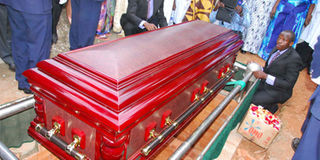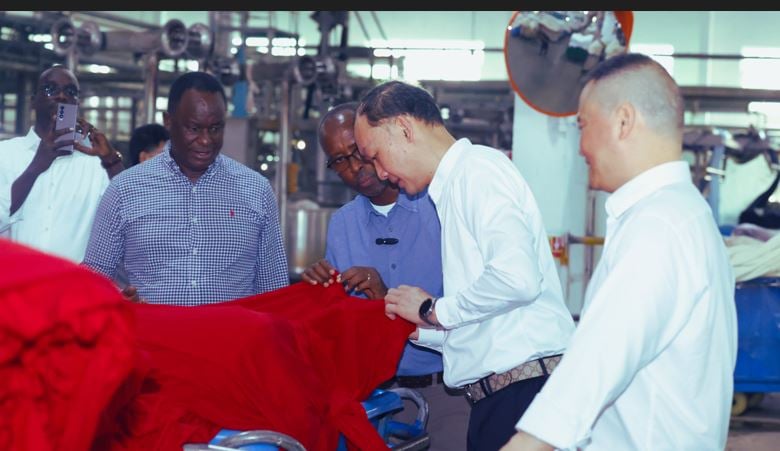In the business of managing the dearly departed

A-Plus funeral mangers lower a casket at a burial ceremony. (Below). A fridge that is used to protect bodies from decomposing. Photos BY Abubakar Lubowa.
What you need to know:
Twenty years ago it was difficult for any one to think of funeral management as a business. But it is now hard for many families to plan the burial of their loved ones without funeral mangers. Didas Kisembo brings you the genesis of funeral management in Uganda.
Undisputed is the fact that toeing the line between business and morality is nothing short of an uphill task. And yet it is upon that line, that the most important foundation of business success is established – that is; clientele trust and loyalty.
Many times, some buckle to pressure of pursuing or abandoning the path whose destination they seek.
However, for Uganda Funeral Services, that has become a daily routine. Theirs is the business of handling the fragility of the bereaved and ensuring their comfort as well as that of the dead.
“Ours is a service premised on the need to ensure that when one passes on, they get a dignified send-off which also reduces on the shock of those they leave behind,” explains Regina Mukiibi, the managing director Uganda Funeral Services.
Mukiibi denotes that choosing this line of work was no an easy feat. She recalls how perceptions, culture, ridicule from the public and even death in the family did not deter her from pursuing this cause.
“I used to be an accountant with Uganda Commercial Bank but that ended in the early 1990s – to be specific 1993. At the time, I had worked at the bank for 15 years and felt I need to move on to new challenges,” she says.
“It was not an easy exit. Nevertheless, when I finally made it out, I used my compensation package – which was substantial by the way about Shs15m – to start a tour company in partnership with my brother Fredrick Mukiibi, a lawyer.”
The turning point
Mukiibi points to that, as the turning point that ultimately changed the course of her life. She says it is through the tour company, which they named Federico, that they were afforded ticket rebates of 25 per cent on travels across the globe – an opportunity whose exposure also brought more than she had bargained for.
“The airline used to pay 75 per cent of our travel fees. I travelled a lot, to different continents. It was however in America where we stumbled upon the idea of a Funeral Services business. I was awed by the way the Americans managed and buried their dead in a really respectable and gracious way,” she explains, adding that is when my brother and I noted that we didn’t have such a service back home.”
“We were oblivious of what it entailed to run a funeral service business so we sought training from the Salzburg Funeral Science Institute in UK, earning a Diploma in the art. We returned home thereafter, closing the tour business and establishing the funeral services home around 1997.”
Hard times
“It was a hard start because my Fredrick, with whom I had envisaged the idea and established the business, died,” she says.
“That was a difficult moment, a deciding moment. I had to choose between swimming on with the business and sinking it. I even went to the extremes of contemplating about returning to the bank though I expected they would not allow me,” she adds.
Mukiibi notes that if it was not for the passion to help the bereaved, she would have given up.
But with courage from a few personnel, mainly sourced from family, she propelled the company forward into the new millennium, battling several other major hurdles.
“There was the issue of perception of the service in the beginning. People did not see the value in having someone else manage their loved ones funerals,” she says.
“We had to sensitise and conduct awareness campaigns to bring them around to the fact that it was more convenient, safe and even cheaper to use our service.”
However, perception was not the least of their worries as there was also the issue of cultural norms that posed a huge stumbling block to the business’ expansion.
“In Africa for example, women are expect to handle the bodies of their dead husbands with bare hands. It would be deemed inconceivable or even deemed disrespectful for them to handle the body with gloves,” she narrates.
Changing tide
However, slowly by slowly the tide has changed and the business appears to be growing as well as attracting new players like A-Plus Funeral Services.
Creating employment
Today, Uganda Funeral Services employs more than 60 people in branches of Kampala, Masaka, Mbarara, Fort Portal and Gulu.
The company has also received a number of awards including being recognised among Uganda’s top 50 brands. ndividually, Mukiibi has been recongised by Uganda Investment Authority as the 2012 investor of the year. She has also won the 2013 Phenomenal Woman of Funeral Service Trail Blazer award presented to her in Austin, Texas.
Future plans
Looking to the future, she forecasts how plans are already in place to expand her funeral services to all corners of the country.
“The east. We shall open a branch in the east. That is in the offing. Our goal is to reach every Ugandan irrespective of their walk of life whether poor or rich and irrespective of religion,” she says. She also says they are planning to widen and make their insurance scheme better.
“Shs43,000 annually is all one has to pay and their funeral costs will be covered by us. But there is a catch, the offer takes effect 6 months after payment for natural deaths, and in the case of accidents 24 hours and it is not open to people above 85 years of age,” she explains.
“We also have pre-payment plans. You tell us what you want on your funeral or that of a family member or friend and we will calculate and divulge the costs and once you decide and effect the payment, we issue you with a certificate which is to be presented in the incidence of death and all costs are met.”
More than just a job
For Mukiibi and her team, managing funerals is more than just a business, it is a noble service for the betterment of humanity and it is for that reason that their courage and dedication to this cause has remained strong for the last 18 years.
“I have no regrets looking back and cannot leave this for anything else because seeing people comforted by our service in trying times motivates me to go on doing this every day,” she says.
Numbers
Annual premiums per package
0-50years: Noble-Shs43,000, classic Shs64,000, executive-90,000, royal-132,000
51-65years: Noble Shs56,000, classic Shs91,000, executive Shs134,000, royal Shs203,000
66-85years: Noble Shs146,000, classic Shs261,000, executive Shs410,000, royal Shs627,000




